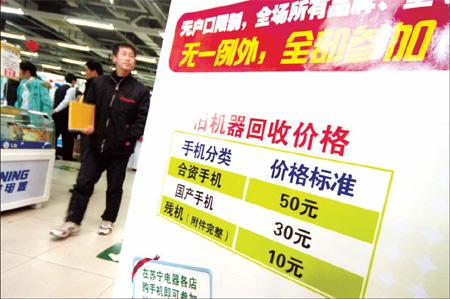
A poster in this Suning store shows the prices of exchanging old mobile phones. [Wu Changqing / for China Daily]
Beijingers will be spoilt for choice when it comes to shopping for household and electronic goods, with the two giants of the industry, Suning and Gome, embarking on ambitious expansion plans.
The two are planning to open 30 stores in the city this year.
Suning has 20 stores planned, with its flagship outlet opening this weekend in Beitaipingzhuang, Haidian district. By the end of the year, Suning will have 86 stores in Beijing.
Gome will open 10 this year after its latest store, in Madian, Chaoyang district, took in 120 million yuan in the first three days of its operations when it started on April 16. It has 50 in the city already.
The annual industry survey by the China Chain Store and Franchise Association, released earlier this month, has Suning topping the China's chain retailers' list last year, with sales reaching 117 billion yuan, displacing Gome.
Yuan Jinxiang, Suning's marketing department manager, said its new stores will be aimed at different income groups. For example, six of the 12 it opened last year have luxury products and are targeted at the higher-income group.
"We will also introduce international brands such as Electrolux, LG and Samsung," Yuan said.
"Our aim is to make as many brands of appliances as possible available in Suning."
In addition, two of the stores planned for this year will be aimed at the lower income group.
Yuan said stores usually cover between 4,000 to 10,000 sq m.
"But we will build a store this year that will cover about 100,000 sq m," Yuan said.
Hu Yongfeng, Gome's marketing manager, said it plans to introduce several areas where customers can handle and try the products before buying them.
"This will overturn the traditional idea at a store where customers can seldom try the products before making up their minds."
The two companies will also stop using promotional personnel from the various brands, but will instead train their employees to do the job.
Chen Lei, a senior market analyst, said the industry is growing at a rate of 20 to 30 percent each year.
He expects to see stores dedicated not only to the high-end market, but to people with lower incomes.
"That'll be good for Chinese companies planning to step into the international market," Chen said.





